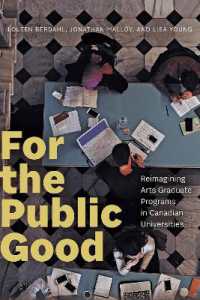Full Description
In this innovative introductory sociology text, Lorne Tepperman and James Curtis assemble an impressive array of experts to explain key concepts of sociology in ways that students will understand and enjoy. The subjects covered include both those close to readers' everyday lives - socialization, gender, education, and those perhaps further removed but just as important to understanding society - deviance, politics, the environment. "Sociology: A Canadian Perspective" also includes chapters on the theory and methods of sociology, allowing students deeper understanding of the various subjects studied by sociologist and introducing them to the tools they themselves can use to do sociology. Distinctive features such as thought-provoking 'First Person' boxes provide an intriguing glimpse into why the contributors chose to make sociology their lifework. The whole is rounded out with powerful theme boxes, tables, figures, and photographs that deepen students' understanding of sociology and bring it to life. "Sociology: A Canadian Perspective" provides all the essentials of an introductory sociology text with a visually stimulating design and effective pedagogy.
The result is a text that is sure to captivate students' attention and teach them that sociology has coherence, substantive content, and precision.
Contents
Preface; Part I Introduction: The Sociological Approach; 1. What Is Sociology?; Learning Objectives; Introduction; A Definition of Sociology; Sociology Goes Beyond and Corrects Common Sense; How Sociology Differs from Other Academic Fields; Social Structure and Culture as the Central Topics of Sociology; The Development of Sociology; Four Sociological Paradigms; Sociology and Social Change; Conclusion; Questions for Critical Thought; Recommended Readings; Recommended Web Sites; Part II Major Social Processes; 2. Culture and Culture Change; Learning Objectives; Why Study Culture?; What Is Culture?; The Role of Culture in Social Theory; Cultural Realms; Cultural Dynamics; Canadian Culture; Conclusion; Questions for Critical Thought; Recommended Readings; Recommended Web Sites; 3. Socialization; Learning Objectives; Introduction; Forms of Socialization; Theories of Socialization; Agents of Socialization; Socialization Outcomes; Future Directions; Conclusions; Questions for Critical Thought; Recommended Readings; Recommended Web Sites; 4. Roles and Identities; Learning Objectives; Introduction; The Social Nature of Identity and Role; Role; Identity; Where Role and Identity Come Together; Conclusion; Questions for Critical Thought; Recommended Readings; Recommended Web Sites; 5. Groups and Organizations; Learning Objectives; Introduction; Sets of People; Cliques; Bureaucracies; The Evolution of Organizational Theory and Research; How Bureaucracies Actually Work; Conclusion; Questions for Critical Thought; Recommended Readings; Recommended Web Sites; 6. Deviance; Learning Objectives; Introduction; What Is Deviance?; Deviance as a Sociological Concept; Researching Deviance; The Sociology of Deviant Behaviour; Making Sense of the "Facts" of Deviant Behaviour; The Sociology of Deviant Categories; Conclusion; Questions for Critical Thinking; Recommended Readings; Recommended Web Sites; Part III Social Institutions; 7. Families; Learning Objectives; Introduction; Family Variations; Explaining Family Patterns and Practices; Recent Issues in Canadian Families; Overview of Canadian Family Policies; Future Families; Conclusion; Questions for Critical Thought; Recommended Readings; Recommended Web Sites; 8. Education; Learning Objectives; Introduction; The Changing Face of Education; Alternative Accounts of Educational Growth and Development; Educational Participants; Educational Policy, Politics, and Ideologies; Education, Work, and Family; Education and New Technologies; Educational Opportunities and Inequalities; Conclusion; Questions for Critical Thought; Recommended Readings; Recommended Web Sites; 9. Work and the Economy; Learning Objectives; Introduction; World Economic Systems; The Global Economy; The Capitalist Economy: Where People Work; Managerial Strategies of Control; The Social Organization of Work Today; The Changing Face of Labour: Diversity Among Workers; Workers' Coping and Resistance: The Struggle for Dignity and Rights; Questions for Critical Thought; Recommended Readings; Recommended Web Sites; 10. Health Issues; Learning Objectives; Introduction; Theoretical Perspectives; The Sociology of Health, Illness, Disease, and Sickness; Sociology of Medicine; Conclusions; Questions for Critical Thought; Recommended Readings; Recommended Web Sites; 11. Religion; Learning Objectives; Introduction: Why Study Religion?; Three Methodological Dilemmas of the Sociology of Religion; The Importance of Religion in Classical Sociological Theory; Religion vs Modernity: The Ambiguous Legacy of Secularization Theory; The Religious Life of Contemporary Canadians; The Future of Religion; Questions for Critical Thought; Recommended Readings; Recommended Web Sites; 12. Politics and Political Movements; Learning Objectives; Introduction; Core Concepts; The Emergence of Modern States; Modern State Institutions; Perspectives on the Democratic State; Democracy and Politics in Canada; Challenging Issues and Political Movements; Conclusion: Future Developments; Questions for Critical Thought; Recommended Readings; Recommended Web Sites; 13. Social Movements; Learning Objectives; Introduction; What Is a Social Movement?; Theoretical Approaches; The Analysis of Social Movements; Conclusion; Questions for Critical Thought; Recommended Readings; Recommended Web Sites; Part IV Social Inequality; 14. Class and Status Inequality; Learning Objectives; Introduction; What Is Social Class?; Defining and Measuring Social Class; Social Class and Inequality; Conclusion: Does Class Matter?; Questions for Critical Thought; Recommended Readings; Recommended Web Sites; 15. Gender Relations; Learning Objectives; Introduction; Theories of the Sexes; Growing Up Feminine or Masculine; A Division of Labour by Sex; Community and Social Life; Explanations for Inequality: Making Connections; Strategies for Change; Looking Ahead; Conclusion; Questions for Critical Thought; Recommended Readings; Recommended Web Sites; 16. Ethnic and Race Relations; Learning Objectives; Introduction; Defining Ethnicity and Race; Theories of Ethnicity; Ethnicity in the Canadian Context; Patterns of Immigration to Canada; Patterns of Inter-group Relations in Canada; Prejudice and Discrimination; Ethnicity and the Future of Canada; Conclusion; Questions for Critical Thought; Recommended Readings; Recommended Web Sites; Part V Canadian Society and the Global Context; 17. Global Society; Learning Objectives; Introduction; What Is Globalization?; The Effect of Globalization Mechanisms; Treaties and International Organizations; Trade and Investment: Rich Countries; Trade and Investment: Poor Countries; Social Networks and the Movement of Populations; Cultural Homogenization; Conclusion; Questions for Critical Thought; Recommended Readings; Recommended Web Sites; 18. Population and Society; Learning Objectives; Introduction; Demographic Change and Social Change; World Population; Age Compositions of Developed and Developing Countries; Theories of Population Change; Canada's Population: An Overview; Conclusion; Questions for Critical Thought; Recommended Readings; Recommended Web Sites; 19. Cities and Urbanization; Learning Objectives; Introduction; Urbanization; Globalization and Global Cities; Urbanism; Ecology; Structural Analysis; Conclusion; Questions for Critical Thought; Recommended Readings; Recommended Web Sites; 20. Mass Media and Technology; Learning Objectives; Introduction; Defining the Media; Canada and Mass Communication; Radio Broadcasting Yesterday; Television Today; The Changing Music Industry of Today; The Internet; Conclusion: Theory of Technology; Questions for Critical Thought; Recommended Readings; Recommended Web Sites; 21. The Environment; Learning Objectives; Introduction; The Basics of Environmental Sociology; The Environment and Ecological Scarcity; The Environment and Social Theory; The Environment and Social Movements; Conclusion; Questions for Critical Thought; Recommended Readings; Recommended Web Sites; Part VI Sociological Theory and Methods; 22. Sociological Theory; Learning Objectives; Introduction; Getting One's Bearings: On Science and Theory, Natural, and Social; Theoretical Perspectives in Sociology; Future Prospects and Ongoing Challenges; Conclusion; Questions for Critical Thought; Recommended Readings; Recommended Web Sites; 23. Research Methods; Learning Objectives; Introduction; Sociology as a Science; Theory and Research; Research Techniques; The Context of Sociological Research; Conclusion; Questions for Critical Thought; Recommended Readings; Recommended Web Sites; References; Glossary; Contributors; List of Tables, Figures, and Boxes; Index







